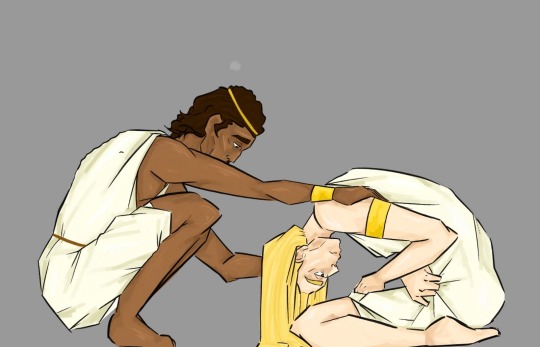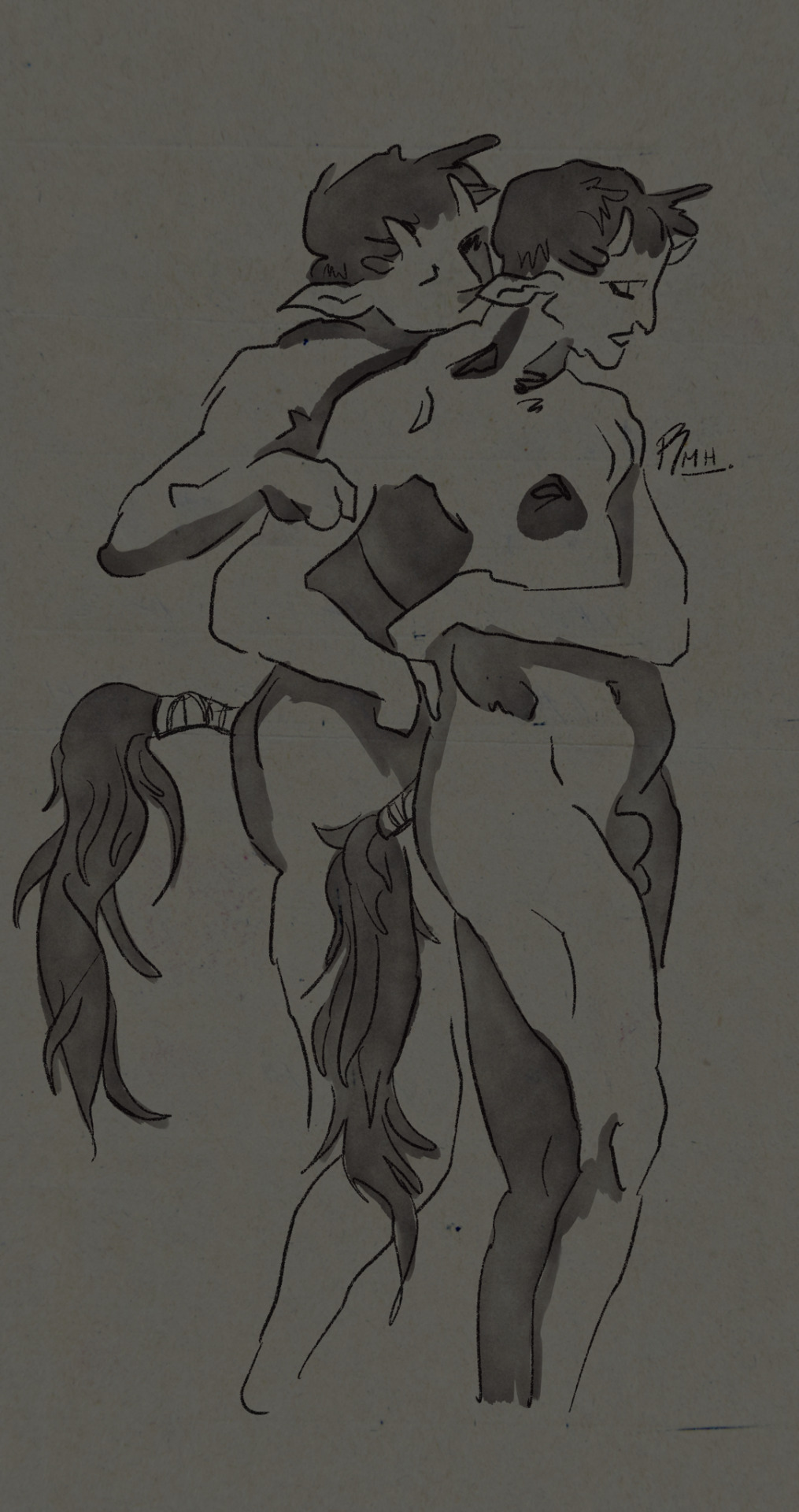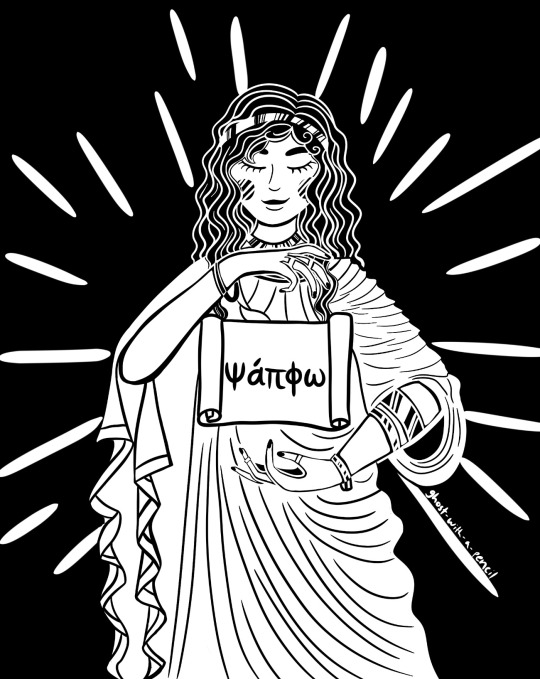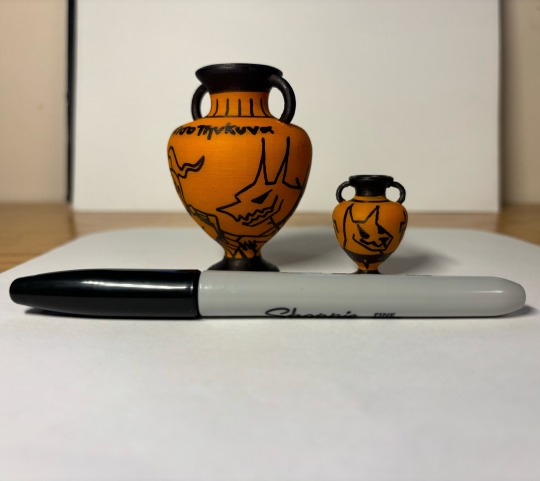#Ancient Greek language
Text
ἀρνοκόμης (arnokomes) - an epithet assigned to Apollo that means of lamb-like hair or curly-haired.
746 notes
·
View notes
Text
Come, shining lyre, speak to me--gain the power of utterance.
ἄγι δὴ χέλυ δῖα μοι λέγε
φωνάεσσα δὲ γίνεω.
--Sappho, fr. 118
#quote#quotes#classics#tagamemnon#Sappho#Greek#Greek language#Ancient Greek#Ancient Greek language#Greek translation#Ancient Greek translation#poetry#poetry in translation#Greek poetry#Ancient Greek poetry#fragment
538 notes
·
View notes
Text
"In a famous scene in Book 6 of 'The Iliad,' Andromache, accompanied by her baby son and enslaved nurse, begs her husband, the great Trojan warrior Hector, to adopt a less dangerous military strategy, rather than face the enemy on the open plain. He refuses, and they part for the last time. In the original Greek, the wife and husband each use the same word to address one another: 'daimonios.' The word is cognate with 'daimōn' — 'spirit' or 'deity' (from which we get the English 'demon') — and presumably suggests, in its most literal sense, that a person is influenced by some superhuman power. Yet it is surprisingly common in Homer, generally used when one individual addresses another. It is sometimes taken to suggest little more than 'Sir' or 'Ma’am'; sometimes the context suggests it is negative ('possessed' or 'crazy'), sometimes the opposite ('You marvelous person!').
Many translators of this scene use different renditions of the word in the two instances. In Lattimore, Andromache calls Hector 'Dearest,' while he calls her 'Poor Andromache!'; in Fagles, Andromache calls Hector 'Reckless one,' while Hector calls Andromache 'Dear one'; in Fitzgerald, Andromache uses 'Wild one,' and Hector uses 'Unquiet soul' (a lovely phrase lifted from Shakespeare’s 'Merchant of Venice' — although oral poetry does not abound in clever literary quotations). I felt it was important to use the same word for both the wife addressing the husband, and the husband addressing the wife, to echo the symmetry suggested in the original, and I used 'strange' in both instances ('strange man … strange woman,' echoing the different genders of the original). I hoped that this word might hint at the Greek term’s suggestion of something unusual, perhaps divine or inhuman. This heartbreaking scene evokes both deep intimacy and profound estrangement between husband and wife, one of whom will soon be dead and the other enslaved."
- Emily Wilson, from "Emily Wilson on 5 crucial decisions she made in her ‘Iliad’ translation." Washington Post, 20 September 2023.
#i'm so intrigued by this new iliad translation that just came out!#emily wilson#quote#quotations#homer#the iliad#hector of troy#andromache of troy#hector and andromache#ancient greek language#classics
172 notes
·
View notes
Text

fan art of Achilles and Patroclus
#asthetic#achilles x patroclus#patrochilles#achilles and patroclus#incorrect patrochilles quotes#patroclus#the song of achilles#achilles#achillian#achilles heel#ancient origins#ancient history#ancient greece#ancient greek mythology#ancient greek literature#ancient art#ancient greek art#ancient greek memes#ancient greek#ancient greek language#greek mythology#greekmythology#greek posts#greek tumblr#greek gods#madeline miller#song of achilles#sadgirl#moodboard#fanart
127 notes
·
View notes
Text

Satyrs at play
#digital art#procreate#art#artists on tumblr#digital arwork#digital sketch#satyr boy#satyr#dnd satyr#satyr art#ancient greek#greek tumblr#greek mythology#greek gods#ancient greek language#ancient greece#ancient civilizations#ancient history#ancient rome#ancient roman art#ancient greek art#roman satyr#greek satyr
100 notes
·
View notes
Text
ᴛʏᴘᴇs ᴏғ 𝐋𝐎𝐕𝐄 ɪɴ ᴀɴᴄɪᴇɴᴛ ɢʀᴇᴇᴄᴇ
Ancient Greeks divided love in different categories due to their need to classify and give a name to everything. They had eight different types of love:
’αγάπη (agapē): unconditional love, mental, sometimes it can be not reciprocated
φιλία (philia): affection between friends, parents
ερως (érōs): physical love, it's about the sexual aspect; something that cannot be satiated (it doesn't necessarily have to be satisfied)
αντέρως (antérōs): reciprocated love, there’s a bond
’ιμεροσ (hī́meros): unstoppable love (it must be satisfied)
πόθος (póthos): desire (imaginary, dreamed)
στοργή (storgḗ): tender love, sweet (family love)
θέλημα (thélēma): devotion (love for what you do)
Let me know if you like this type of post and if you want me to do more.
#types of love in ancient greece#love#ancient greece#ancient greek culture#ancient greek literature#ancient greek language#greek posts#types of love#writeblr#bookblr#greek mythology#darkest academia#academia aesthetic#light academia#romantic academia#aesthetic#writing ideas#writing tips#dark academia#chaotic academia#spilled thoughts#cottage academia#spilled feelings#bookworm#writing#poetry#literature#spilled words#new words
787 notes
·
View notes
Text

Ψάπφω-
the way the ancient Greek poet, Sappho of Lesbos, likely would have written her name. I got this new tat last week on a research trip to study her impact on the queer community, now she will be with me always.
#sapphic#sappho#lesbian#poetry#writing#poetsandwriters#poems#wlw love#queer history#aesthetic#tattoos#beautiful#lgbtq#lgbtq community#women’s history#ancient greek language#greece
78 notes
·
View notes
Text
day thirtheen + day fourteen
@klaineccfanficlibrary
ἀχώριστος;
what cannot be divided
Listen; it goes
padam padam
this heart of mine.
Handle with care, please,
angel of mine.
For the power of love, it knows
no bounds, and
in its embrace,
true happiness is found.
The story of us,
written in the stars, like–
sh-boom, we burst into love's arms.
Last night on earth, we danced
in the moonlight and
I kissed you all over
with all my might.
My Blaine,
my lover,
my everything,
my heart's desire.
I love you, I do,
with a burning fire.
Our love grows longer
with each passing day.
Now and then
we'll take time to play.
An everlasting love,
that's what we share and
I know,
if I should fall,
I know you'll be there
behind me and
supporting me through it all,
together we stand.
We'll never fall.
#klainevalentines2024#kurt's poetry#αχωριστια#ancient greek language#i missed the 13th day but i hope i made up for it with today#it was stressful to figure out how to use all the titles 🫠#hope you like it#and happy valenklaine's day 🩷#kurt hummel#blaine anderson#klaine fanfiction#klaine poetry
14 notes
·
View notes
Text
a translator's note i read a long time ago on a sappho poem said that the word they had translated as "boy" and which others had translated as "girl" was technically a gender neutral word meaning "fair youth"
they went with boy because that usage was more common but i think actually the best translation of that poem must be
sweet mother i cannot weave for slender aphrodite has overcome me with longing for a twink
#sappho#sapphic#poetry#twink#queer poems#ancient greek language#translation#queer history#queer shit
328 notes
·
View notes
Text

“May I write words more naked than flesh,
stronger than bone, more resilient than
sinew, sensitive than nerve.”
I’ve been totally in love with Sappho and her works recently, so inspiration struck! I used this vase painting of her

(it was painted over 100 years postmortem, but it’s the earliest confirmed image of her that has survived)
#ancient greek literature#ancient greece#ancient greek language#Sappho#sappho of lesbos#digital art#original content wow#poetry#ancient greek poetry#procreate#digital portrait
64 notes
·
View notes
Text
The second part of my “Hellhounds through History” for @juliet-hellhound-week! While the other vase was more of a dedication to Juliet, this vase serves more as a warning to unfortunate souls….
The design, including the running person and the style of Juliet is based off of real vases.
The words are “ευλαβεισο την κυνα του Ταρταρου• ο δαιμων η Ιουλιετα”, which means “Beware the dog of Hell, the demon Juliet” :)
Part 1
More info and ID below!
I wrote the words in boustrophedon, which is the writing system used in Ancient Greece where every other line is reverse with flipped letters. It’s not totally accurate because I had to use lowercase instead of all caps, or else the letters wouldnt all fit lol.
As mentioned in my old Crowley edit post, i chose “Tartarus” instead of “Hades” to translate “hell”, since the place of Hades is the afterlife in general, and Tartarus is the place of torture. And of course, “daimon” doesnt have the same connotations as English “demon”, but its the best fit! I chose “ευλαβεισθαι” instead of “φυλασσομαι” because it means “to fear, beware, have reverence for”, etc, rather than “to beware, watch, keep guard, avoid, etc”.
Credit
Size reference because it is small and im proud how well they still came out! :)

[Image description: The first attachment is a video of a small orange and black vase being rotated. The front side is a drawing of a stylized Juliet chasing an Ancient Greek soldier. There are also words that say “ευλαβεισο την κυνα του Ταρταρου• ο δαιμων η Ιουλιετα” in the boustrophedon writing style. The second attachment is an image of the small Juliet vase next to the larger vase from the video with a sharpie in front. The height of the large vase is about half of the sharpie, and the small vase is about one fourth. End image description.]
#juliet#crowley#spn#supernatural#juliethellhoundweek#ancient greek#ancient greek language#artists on tumblr#ancient greece#tagamemnon#juliet the hellhound#damien’s fanart!#hellhound
8 notes
·
View notes
Text
ἱμερτός (himertos) - a poetic epithet given to Apollo and Dionysus with the meaning dear, desired, longed for, lovely.
#APOLLO 🌞#BACO 🍷#LINGUA 📜#Source text : Greek Anthology Book 9 - Declamatory epigrams.#ancient greek language#apollo#dionysus#dionysus deity
564 notes
·
View notes
Text
Human beings exist for the sake of one another: so, either teach them or endure them.
Οἱ ἄνθρωποι γεγόνασιν ἀλλήλων ἕνεκεν: ἢ δίδασκε οὖν ἢ φέρε.
--Marcus Aurelius, Meditations VIII.59
#quote#quotes#classics#tagamemnon#Marcus Aurelius#Meditations#philosophy#ancient philosophy#Stoicism#Greek#Greek language#Greek translation#Ancient Greek#Ancient Greek language#Ancient Greek translation
320 notes
·
View notes
Text
τό δέ σῶμα αὐτοῦ ἀλινδεῖται,
ἐκ τοῦ ὤμου ῥαγὲν·
ἀκούσεις δὲ τὰ ὀστᾶ ὑμνοῦντα,
ἐν τροπῷ τοῦ τρήματος ᾆδοντα.
"and his body rolls over,
crushed from the shoulder;
you can hear the bones humming,
singing like a puncture."
coil - ostia (the death ov pasolini)
#took liberties with this#υμνεω means to sing a hymn but i thought that was nice#ancient greek#tagamemnon#coil#coil music#john balance#peter christopherson#horse rotorvator#langblr#ancient greek language#some ov the accents are wrong cuz my keyboard so ass
34 notes
·
View notes
Text
Idk what Percy Jackson was on, but ancient greek is so fucking hard.
Like its just funky squiggles but sometimes the squiggles mean i need to breath differently to pronounce the word properly?
#percy jackson#ancient greek#ancient greek language#seriously learning ancient greek is so hard#dont get me wrong its fun#but oh my god i feel like im summoning a demon trying to say just a name
6 notes
·
View notes
Text
I have to make a presentation for the Greek particle Γάρ δή due tomorrow and the book my professor gave me doesn't explain any uses it just throws a bunch of sentences at me with sporadic tidbits of English that isn't enough for a whole page.
How many jokes can I fit in before I leave professionalism and need to rework it?
#thesearemyposts#classics#ancient greek#i need to finish it tonight to print copies before class tomorrow#Γάρ δή#classics major#antiquity#ancient greek language#fucking denniston istg#<- the author
2 notes
·
View notes